If you’re wondering how long does THC stay in your body, the answer depends on several factors. THC can be detected in your system for a few days to several weeks based on consumption frequency, metabolism, and the type of drug test used. This article will explore the different detection times for urine, blood, saliva, and hair tests, as well as the factors influencing how long does THC stay in your body.
Key Takeaways
- THC’s retention in the body is influenced by factors such as frequency of use, body fat percentage, metabolism, and genetic makeup, with chronic users retaining THC for longer periods.
- Detection times for THC vary by testing method, with urine tests identifying usage for up to 30 days in chronic users, while blood tests can only identify recent use for a few days.
- Effective detoxification from THC primarily relies on time and abstinence; no quick methods are clinically validated, and excessive hydration does not accelerate THC elimination.
How Your Body Processes THC
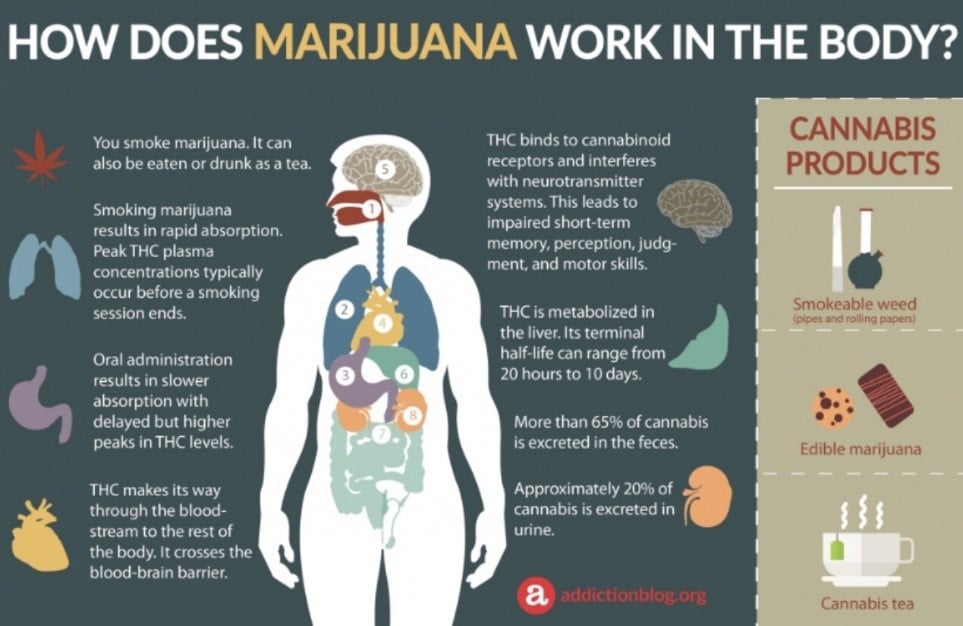
When you engage in smoking marijuana, THC is rapidly absorbed by the lungs and then enters the bloodstream almost instantaneously. If eating edibles, on the other hand, THC is first absorbed through the liver before it makes its way into your bloodstream. The manner in which marijuana is consumed plays a crucial role in determining how your body processes THC.
As soon as it’s introduced to the bloodstream, THC undergoes a significant transformation within the liver where it changes into 11-hydroxy-THC—a substance that subsequently gets broken down into inactive compounds. But because of THC’s ability to dissolve in fat, rather than remain idle within bodily fluids. Fatty tissues known as adipose tissue absorb this compound prior to metabolism taking place. This explains why individuals with more fatty deposits might experience prolonged retention times for substances like THCs due to their half lives being influenced by increased body fat levels.
Not everyone metabolizes THC at an identical rate since factors such as frequency of consumption and genetic variations can greatly affect efficiency when processing this compound. Habitual users are likely to have longer detection periods compared with those who use marijuana less frequently due to these variables affecting enzymatic activities responsible for breaking down thc within one’s system.
Detection Times for THC
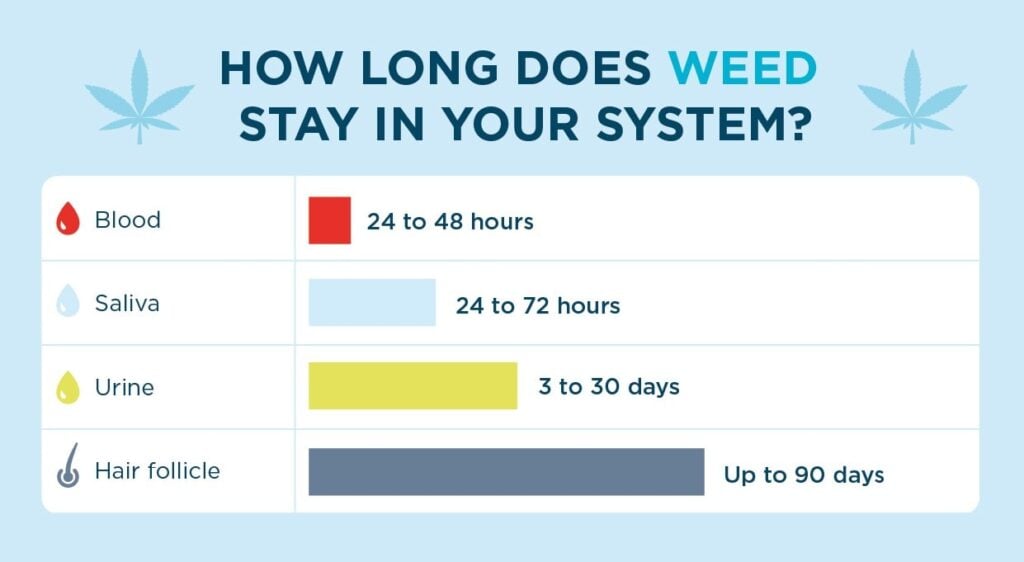
The length of time that marijuana is detectable in your body can differ, as it’s influenced by multiple elements such as how often you use it and your individual metabolic rate. The process of determining an exact duration isn’t simple due to these varying factors. Through several testing methods—urine, blood, saliva, and hair tests—THC presence can be identified over periods ranging from a few hours up to several weeks after ingestion.
Typically, THC could appear in urine tests for about 30 days for individuals who frequently use cannabis. In contrast, the full clearance of weed from one’s system may take between five to 65 days post-use based on the consistency of consumption.
Urine Tests
Urine tests are widely regarded as the most common method for detecting the use of marijuana, esteemed for both their ease of use and dependability. In individuals who partake in marijuana occasionally, THC may remain detectable in urine up to three days post-use. Those who frequently consume marijuana might yield a positive test result even 70 days later. Notably, after just one instance of usage, traces of THC can be found in urine for a duration that extends to roughly 72 hours.
These tests enjoy widespread utilization due largely to their non-invasive procedure and effective identification capabilities regarding THC metabolites—which are present following drug consumption. Employers looking to administer drug screening commonly opt for this type of testing due to its proven track record across various application settings.
Blood Tests
Blood examinations provide a limited timeframe for detection yet are exceptionally precise in pinpointing recent use of marijuana. Individuals who infrequently consume marijuana may have THC present in their blood for a duration ranging from one to two days. In contrast, those who habitually use marijuana could show traceable amounts of THC in their system that persist for as long as seven days.
After smoking, THC swiftly enters the bloodstream and reaches its highest concentration within minutes. Usually, THC can be detected circulating in the blood for roughly three to four hours after it has been consumed. Although the window for detecting this substance through blood tests is relatively brief, these tests serve as an important instrument when there’s a necessity to ascertain recent consumption with accuracy.
Saliva Tests
Saliva tests serve as a popular approach for identifying cannabis use, particularly during roadside inspections and certain job screenings. They are capable of detecting THC in saliva up to 34 hours post-consumption. This technique employs an uncomplicated mouth swab, rendering it both swift and non-invasive. Nevertheless, shortly after consumption, the absorption of THC into the mouth’s tissues can markedly alter levels present in saliva, potentially impacting the outcomes of the test.
Hair Tests
Hair tests possess the distinctive capability to identify THC metabolites for up to 90 days post-consumption. They serve as an effective tool for evaluating prolonged use of marijuana, offering insight into weed consumption spanning a three-month duration.
These tests function by examining hair follicles that hold onto THC metabolites over long stretches. This approach is especially beneficial for employers or institutions seeking to track extended patterns of cannabis use with the help of a hair test.
Factors Affecting THC Retention
The duration of THC retention in your system is determined by a variety of elements, including how often you use it and the speed at which your body metabolizes substances. People who use marijuana regularly can expect to have THC linger in their bodies for up to 30 days, while those who partake infrequently may find that their systems are clear within approximately three days. The propensity for THC to dissolve in fat also implies that individuals with higher body fat percentages tend to retain the compound for longer periods.
Metabolic rate and quantity of consumption are important factors affecting how long THC stays present in the body. Individuals endowed with a more rapid metabolism typically flush out THC faster than those with slower metabolic functions. Genetic differences influencing enzyme activity Contribute to variations in how effectively one’s body processes and eliminates THC.
Effects of Marijuana on the Body
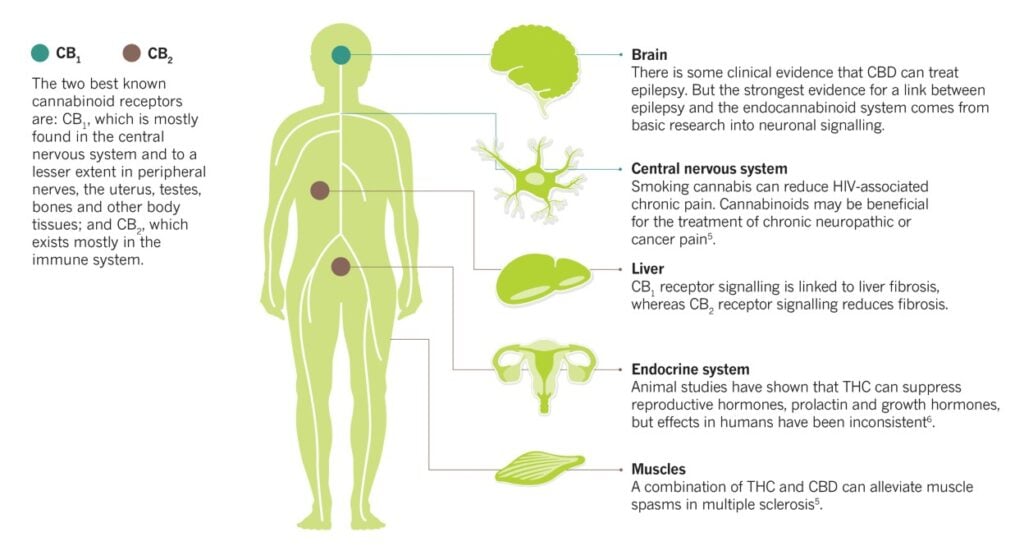
The use of marijuana can induce a range of impacts on both the mental and physical states. Enhanced sensitivity to auditory stimuli may occur, alongside potential disruption in cognitive functions that could impede learning and memory retention. Persistent marijuana use during adolescence is linked with enduring alterations in brain maturation.
Frequent smoking of weed might agitate the respiratory system, elevating the likelihood of persistent lung complications. It may precipitate psychiatric conditions, especially among those genetically inclined towards such disorders. Long-term reliance on weed could result in physical dependency, manifesting withdrawal symptoms when usage is discontinued.
Detoxing from THC
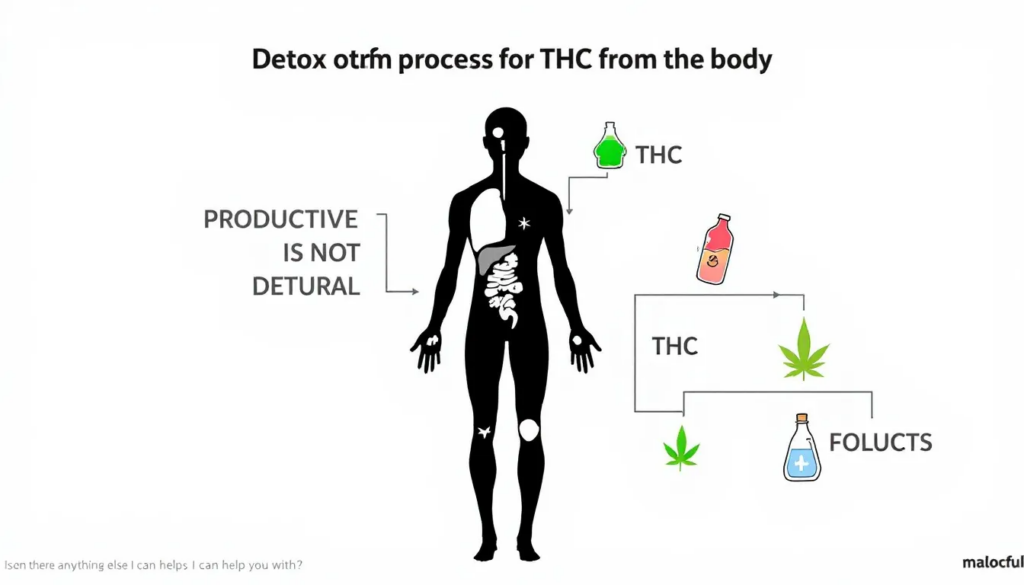
To purge THC from your body effectively, time is the key factor as it allows for the natural expulsion during the detoxification process. Seeking guidance from healthcare experts can lead to personalized detox strategies. Products claiming swift elimination of THC are often unsupported by scientific evidence.
Maintaining good hydration plays a vital role in overall health. Overhydration won’t expedite the removal of THC or boost hydration levels further. No reliable techniques have been established for hastening THC metabolism, and purported shortcuts to passing drug tests typically amount to mere myths. It’s important to note that traces of THC may linger in one’s system longer than anticipated.
Ceasing marijuana consumption entirely stands out as the most effective strategy for ensuring success on a drug test. Abstinence remains unrivaled in terms of reliability when preparing for such an evaluation.
Employment Drug Testing
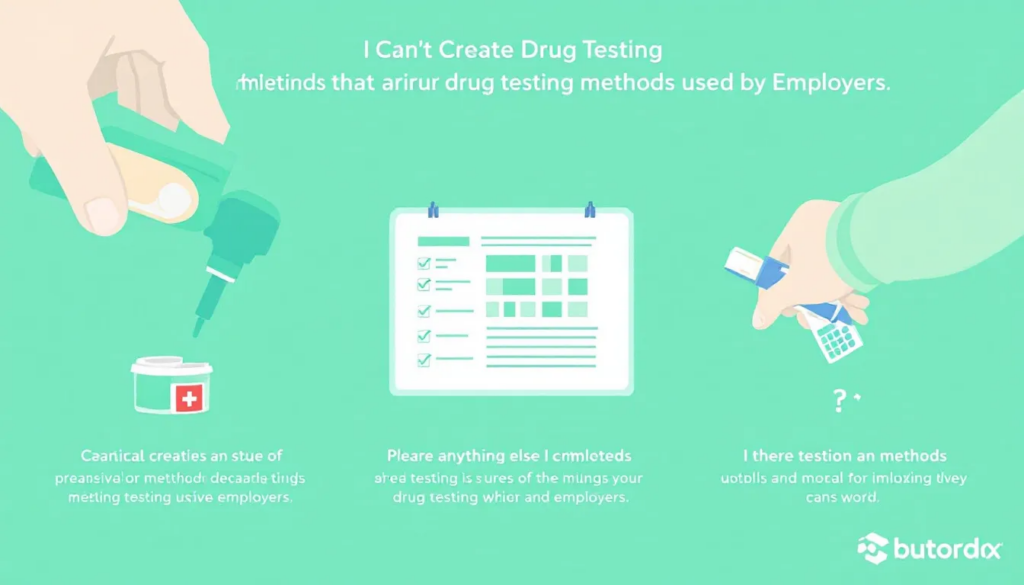
Considering the statistic that roughly 30% of individuals between 16 and 59 years old have tried marijuana at least once, a significant number of employers mandate drug testing during the recruitment phase. The majority of these workplace drug tests commence with an immunoassay test, which serves as a quick method for preliminary screening.
Even in regions where marijuana use is legal, not passing a drug test can result in being fired from one’s job. Trying to manipulate or cheat on a drug test could carry legal consequences since numerous states have outlawed such actions.
Treatment Options for Marijuana Addiction
Individuals grappling with an addiction to marijuana can choose from a range of treatment options, including:
- A Day Treatment Program at Paramount Recovery Centers that provides about 30 hours of clinical services each week.
- For those seeking more flexibility, there is also a Half-Day Treatment Program offering between 10 and 15 hours of weekly services.
- Dialectical Behavior Therapy (DBT) which assists in enhancing emotional regulation and developing coping mechanisms.
- Family therapy sessions are included to foster repaired trust and improved communication within the family unit.
Paramount Recovery Center integrates Medication-Assisted Treatment (MAT) with psychotherapy techniques. This combination aims to alleviate withdrawal symptoms as well as manage any concurrent conditions associated with substance drugs. The center facilitates patient access by providing flexible payment schemes along with financial support, all delivered through a care model focused on the individual’s needs.
Renowned for its exhaustive and customizable programs, Paramount Recovery Center situated in Massachusetts dedicates itself to delivering a full continuum of care for individuals eager to pursue healthier lifestyles.
Summary
Understanding how your body processes and retains THC is crucial, not just for passing drug tests, but for health and well-being. From absorption and metabolism to detection times and the influencing factors, this guide has covered the essentials.
Whether you’re dealing with employment drug testing or seeking treatment for marijuana addiction, being informed is your best asset. Remember, the journey to understanding THC retention is as complex as the compound itself, but with the right knowledge, you can navigate it with confidence.
Frequently Asked Questions
How long does THC stay in your system?
Factors including the frequency of THC use and your body fat percentage can impact how long THC is identifiable in your system, which could range from several days to weeks.
These variables should be taken into account when evaluating possible times for detecting THC.
What is the most common method for detecting marijuana use?
Urine tests are the most commonly used method for detecting marijuana use. This approach is widely implemented due to its cost-effectiveness and reliability.
Can drinking water help detox THC faster?
Drinking water can aid in hydration, but will not significantly accelerate the detoxification of THC from your system.
Therefore, it is not an effective method for expediting THC clearance.
What are the effects of marijuana on mental health?
Marijuana can adversely affect mental health by causing cognitive impairments and increasing the risk of psychiatric disorders, particularly in those with a genetic vulnerability.
Hence, caution is advised for individuals prone to such conditions.
What treatment options are available for marijuana addiction?
A range of treatment options exists for those struggling with marijuana addiction, including full-day and partial-day programs, the application of Dialectical Behavior Therapy (DBT), therapy that involves family participation, and Medication-Assisted Treatment. These are tailored to accommodate personal requirements.
To identify the best recovery strategy, it is crucial to obtain a professional evaluation that will help determine an appropriate course of action.


